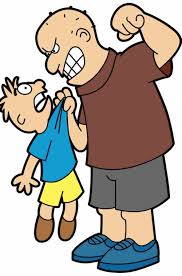bully
英 [ˈbʊl.i]
美 [ˈbʊl.i]
- n. 欺凌弱小者;土霸
- adj. 第一流的;特好的
- vt. 欺负;威吓
- vi. 欺侮人
- adv. 很;十分
- int. 好;妙
- n. (Bully)人名;(法)布利
使用频率:

记忆方法
将“bully”与“bull”结合记忆。想象一头“bull”(公牛)在学校操场或工作场所欺负其他“cows”(牛),即“bully”代表欺凌他人的行为。这种形象化的联想可以帮助快速记忆这个单词。
以上内容由AI生成, 仅供参考和借鉴
中文词源
bully 欺负
来自brother 昵称。原指老大哥,起保护作用,但也可随时以大欺小。
英语词源
- bully
-
bully: [16] Bullies have undergone a sad decline in status. In the 16th century the word meant ‘sweetheart’: ‘Though she be somewhat old, it is my own sweet bully’, John Bale, Three laws 1538. But gradually the rot set in, its meaning passing through ‘fine fellow’ to ‘blusterer’ to the present-day harasser of inferiors. In the 18th and 19th centuries it also meant ‘pimp’.
It is probably a modification of Dutch boele ‘lover’ which, as a term of endearment, may have originated as baby-talk. This bully has no connection with the bully of bully beef [18], which comes from French bouilli, the past participle of bouillir ‘boil’. The bully of bully off [19], a now discontinued way of starting play in hockey, appears to come from a term for ‘scrummage’ in Eton football, but whether that is related to the cruel bully is not clear.
- bully (n.)
- 1530s, originally "sweetheart," applied to either sex, from Dutch boel "lover; brother," probably a diminutive of Middle Dutch broeder "brother" (compare Middle High German buole "brother," source of German Buhle "lover;" see brother (n.)).
Meaning deteriorated 17c. through "fine fellow" and "blusterer" to "harasser of the weak" (1680s, from bully-ruffian, 1650s). Perhaps this was by influence of bull (n.1), but a connecting sense between "lover" and "ruffian" may be in "protector of a prostitute," which was one sense of bully (though not specifically attested until 1706). The expression meaning "worthy, jolly, admirable" (especially in 1864 U.S. slang bully for you!) is first attested 1680s, and preserves an earlier, positive sense of the word. - bully (v.)
- 1710, from bully (n.). Related: Bullied; bullying.
权威例句
- 1. Some people accuse the tax inspectors of bully-boy tactics.
- 有些人指控税务稽查员使用了流氓手段。
- 2. Our maths teacher was a bully and a complete barbarian.
- 我们的数学老师是个坏蛋,一个彻头彻尾的野蛮人。
- 3. The aggression of a bully leaves people feeling hurt, angry and impotent.
- 暴徒的侵犯令人们感到痛心、愤怒却又无能为力。
- 4. He's a coward and a bully who confuses physical strength with manhood.
- 他是一个懦夫,一个分不清蛮力和大丈夫气概的恃强凌弱者。
- 5. We think an attempt to bully them into submission would be counterproductive.
- 我们认为试图迫使他们屈服会适得其反。
